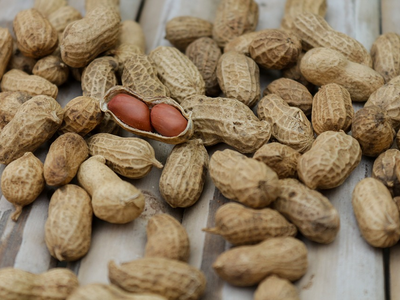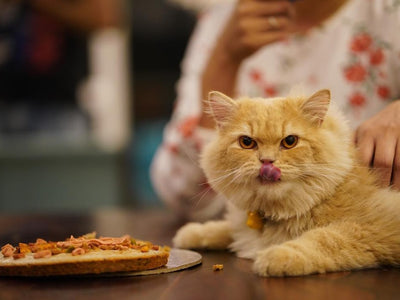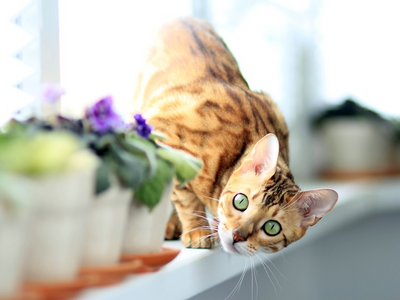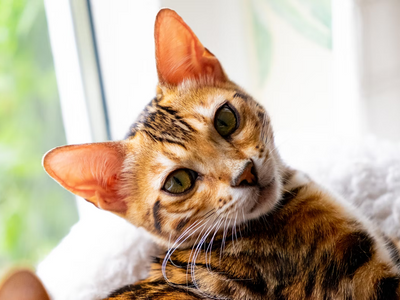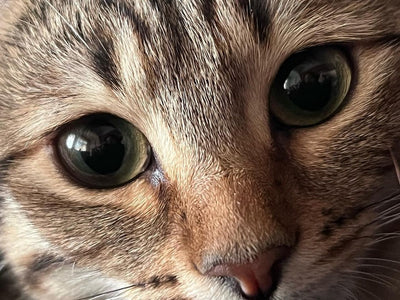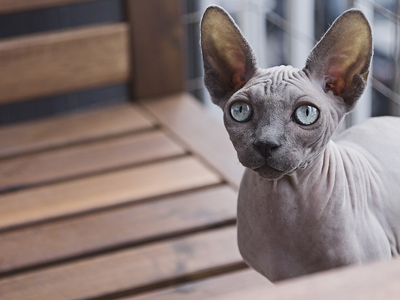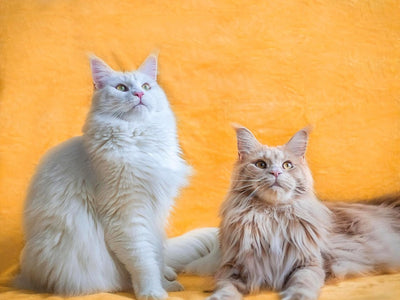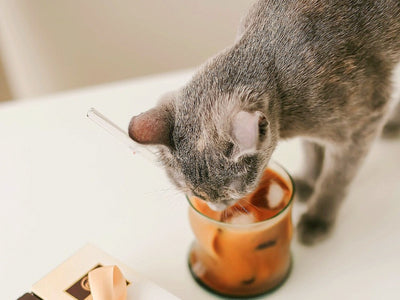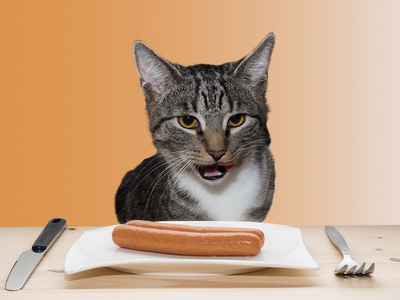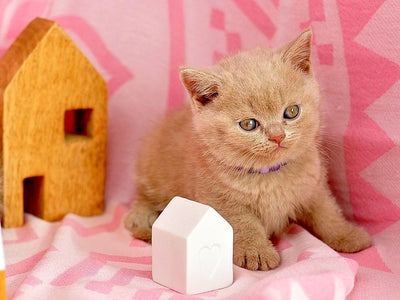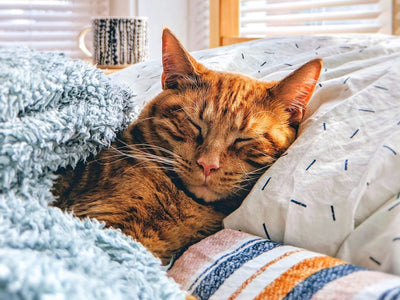11.03.2022
Can cats eat pumpkin, or should you carve it out of their diet?
Pumpkins are much more than Halloween decorations—the winter squash is filled with fibre, moisture, and vitamins that act as natural remedies for digestive problems. But does the nutrient-dense treat benefit our feline companions? Can cats eat pumpkins, or are there better ways to maintain their gastrointestinal health? Let’s explore the potential health benefits of pumpkins in your pet’s diet!
Can cats eat pumpkin?
Yes, cats can eat pumpkins. The hard-skinned gourd is rich in micronutrients, such as soluble fibre, vitamin C, vitamin A, zinc, and potassium, all beneficial to felines. It’s also pretty hydrating, with a 90% moisture content.
If your cat eats high-quality cat food, they’re already getting the required moisture and vitamin allowance from their meals. Like most fruits and veggies, pumpkins shouldn’t be treated as a vitamin supplement but complementary food, i.e. a snack.
Pumpkins are a viable source of fibre and can add bulk to your feline’s diet, so they’re not utterly useless. Although it’s not an essential macronutrient, fibre can help with several conditions, such as:
- Diarrhoea
- Constipation
- Excessive hairballs
- Increased appetite
Because of the high moisture and fibre content, pumpkins have a soothing effect on the feline stomach. The fruit can act as both a laxative and natural antidiarrheal medicine. It can relieve gastrointestinal discomfort, especially in cats suffering from chronic inflammations, such as irritable bowel disorder (IBD).
Since fibre is quite filling, it can be a useful weight management tool. For example, neutered cats can experience bouts of hunger, resulting in unhealthy weight gain. Giving them pumpkin as a snack will satiate their hunger while promoting weight loss, thanks to the low-calorie, high-moisture content.
Keep in mind that soluble fibre absorbs water from the feline digestive tract. If you give your cat too much pumpkin or other high-fibre fruits, it can result in dehydration.
What’s the best way to serve pumpkins to cats?
Pumpkins are an incredibly versatile ingredient in home cooking, but what’s the best way to serve them to your cat? Let’s take a look at the most popular pumpkin products and how they fit into the feline diet:
- Raw pumpkin—Fresh pumpkin is safe for cats as long as you remove the stem, skin, and pulp. The flesh is the only part of the fruit that holds nutritional value. After thoroughly cleaning the pumpkin, slice it into bite-sized bits
- Pumpkin puree—If your cat lost their teeth and can’t eat solids, you can puree the pumpkin and hand-feed it to them. You can also gently cook the squash in water (no seasoning!) to soften the flesh and mush it into smaller pieces. Make sure to remove all the seeds before cooking
- Canned pumpkin—As long as it’s not loaded with additives, fillers, sugar, and seasoning, canned pumpkin is safe for cats. The best way to serve it is to pour a tablespoon of the product into their regular meal once or twice per week
- Jack-O-Lantern—If you catch your pet nibbling on the dusty, crusty Jack-O-Lantern on your window sill, shoo them away immediately! The hollowed-out gorge is a breeding ground for mould and harmful bacteria
Pumpkin baby food for cats—is it nourishing?

Pumpkin—the ultimate baby food for all species?
Source: Christopher Luther
Baby food is mostly free of additives and heavy seasoning, meaning it’s fit for felines. If your cat expresses interest in pumpkin puree, it’s okay to give them a whiff—they might find the texture and aroma palatable.
What about baby cats eating pumpkins? Before they’re three to four weeks old, kittens should only drink breast milk or milk replacer formulas (KMR) in the absence of the mother. Once they’re ready to eat solids, kitties require a special diet consisting of protein, fat, and calcium to sustain their rapid growth.
It’s perfectly safe to give your kitten pumpkin baby food as a treat or as a natural remedy for diarrhoea. The winter squash isn’t particularly caloric, so it won’t mess with their weight, but when it comes to the main course, kitten food is the way to go. The specially formulated recipes contain the perfect nutrient ratio necessary for their development. Combined with KMR, it’ll provide them with nourishment until they’re old enough for adult cat food.
Pumpkin baby food works best for older felines who are more sickly than kittens and often struggle with:
- Appetite loss
- Gastrointestinal issues
- Dental disease
- Weight management
How do I preserve my cat’s digestive tract?
The best way to secure your cat’s long-term health is to mimic their natural feeding pattern. Make sure they get plenty of:
- Water
- Animal protein
- Healthy fats
- Natural vitamins and minerals
Protein is a nutritional powerhouse in the feline diet, providing essential nutrients, such as taurine and arginine. Your cat’s entire metabolism, including their gastrointestinal tract, is biologically designed to digest animal protein. Felines lack the enzymes to process certain nutrients, such as complex or simple carbohydrates.
Top-shelf cat food manufacturers formulate their products to fit the feline’s nutritional requirements. Semi-moist and moist food is probably the closest to what your cat would eat in the wild in terms of protein and water content. Regular servings of wet cat food will promote gastrointestinal health and sustain their metabolism.
Does that mean dry cat food is bad for cats? No, when given in controlled portions. Kibble contains more carbs because it’s made by mixing meat, vegetables, and grains. Overfeeding your cat with biscuits can increase the risk of diabetes and obesity, particularly in genetically predisposed breeds, like Siamese or British Shorthairs.
Dry food also isn’t nearly hydrating enough, with a 10% moisture content on average. If your cat has a preference for kibble, it’s okay to include it in their diet, but make sure they also eat enough wet food.
Looking for nutritious and tasty cat food that’s easy on the tummy? Get Untamed!

Save the pumpkins for All Hallow’s Eve and get that tin opener, human—pronto!
Image (c) Untamed
Untamed helps your kitty live a long and fulfilling life. Our nourishing recipes will keep your cat healthy and happy for as long as felinely possible.
We’ve worked hard to come up with the ultimate feline diet so that every Untamed meal is:
- Full of protein—The protein content in a single serving of Untamed food is twice the industry standard. We don’t use vegetables, meat derivatives, or other useless or harmful substances—only the best animal protein for our feline delicacies
- Made with whole meat—We use premium meat cuts in our tasty and nourishing recipes. Each ingredient is of human-grade quality, and the final product is packed with bioavailable nutrients your cat needs to stay healthy
- Vet-formulated—Our meals are vet-formulated to meet your cat’s unique biological needs. Each serving is nutrient-dense and free of all known allergens
- Ethically produced—We get our ingredients from sustainable sources and use recyclable packaging for our products, leaving a neutral carbon footprint
- Impossible to resist—Untamed doesn’t compromise on taste. Watch your fussy eater jump for joy as soon as you open a tin of our gourmet cat food
Our dishes are gently steamed to keep the original bioavailability of the ingredients intact. The fresh, natural ingredients will have a soothing effect on your cat’s stomach and stabilise their health in the long run! Here’s what you can expect from the Untamed diet:
|
Timeline |
Health benefits |
|
Within a week |
|
|
After two months |
|
|
Within four months |
|
|
Life-long benefits |
|
Check out our delicious recipes!
Untamed food is complete and balanced! Our dishes are made with premium meat cuts, such as:
- Chicken breast and liver
- Duck breast
- Tuna steak
- Salmon fillet
- Sardine and mackerel fillet
Our delicious recipes add nutritional value without compromising the taste! Check out some of our in-demand products:
- Chocka Chicken in Jelly—Mouth-watering chicken breast dipped in jelly and easy on the tummy
- Tuck-in Tuna in Jelly—Dolphin-safe tuna steak in jelly and irresistible fish broth
- Chocka Chicken with Duck in Jelly—An exquisite dish for poultry fans, fresh chicken breast spiced up with delicious duck meat, served in jelly
- Tuck-in Tuna with Salmon in Jelly—Tuna steak in jelly tweaked with high-quality salmon fillet
- Chocka Chicken in Gravy—The ultimate choice for picky cats, made with shredded chicken breast and simmered in natural gravy
Fill out the Untamed online questionnaire to create the perfect meal plan for your furry friend!

Untamed’s Chocka Chicken in Jelly is rich in animal protein, taurine, and all the good stuff your feline friend needs to thrive! And yes, it tastes as good as it sounds.
Image (c) Untamed
Join the Untamed clowder in a few easy steps
If you become a member of the Untamed clowder, your pet will have access to healthy cat food delivered regularly! To try our taster pack at a killer price, follow these steps:
- Visit our Try Now page
- Tell us about your cat (life stage, food preferences, diagnosed allergies)
- Choose a meal plan and confirm your order
We'll deliver your custom-made meal box within a day, with no additional shipping fees! If your cat likes our delicacies, we’ll send monthly supplies of Untamed.
Untamed is the best place to buy cat food online because we offer a flexible service. If you want to alter or cancel your order, let us know, and we'll take care of it.
More high-fibre treats to soothe your cat’s stomach
Fruits and veggies are rich in fibre and antioxidants. If served sparingly and in tiny portions (i.e. no bigger than a cat biscuit), they can ease gastrointestinal discomfort without messing with your cat’s weight.
Pumpkin is the go-to choice for many cat parents, but the following fruits and veggies are also feline-friendly and light on the tummy:
|
Fruit or vegetable |
Fibre content per 100 grams |
Preparation and serving |
|
2 gr |
Cut into small pieces, no stems or leaves |
|
|
Berries |
2.4 gr |
Cut into smaller pieces |
|
2.4 gr |
Sliced, without the stem, leaves, and seeds |
|
|
Mango |
1.6 gr |
Cut into small cubes, no seeds or skin |
|
2.6 g |
Cut into small pieces, fresh or frozen |
|
|
Pineapple |
1.4 gr |
Leaves and rind removed and cleaned from thorns |
|
Broccoli |
2.4 gr |
Gently steamed, unseasoned, and cut into small pieces |
|
Asparagus |
1.4 gr |
Steamed or boiled in water, without seasoning, and cut into bite-sized pieces |
While your feline companion may develop a preference for pumpkins or berries, they’re not cut out to be a vegan. Fruits, veggies, or other high-fibre foods, such as oats or rice, shouldn’t exceed 3% of their overall meal plan.
Cats get all the essential macronutrients from meat, and they can’t have enough of it! Animal protein fuels their metabolism and delivers enough energy for an active and healthy lifestyle. If you want to treat your cat, you can’t go wrong with protein-packed meat snacks, like:
- Turkey
- Chicken
- Liver
- Scallops
- Mussels
- Clams
- Carp
- Salmon
- Cod
- Tuna
- Prawns
Are all fruits and veggies safe for cats?

When it comes to cats, grapes are not only sour—they’re toxic!
Source: Rajesh Rajput
Most fruits and vegetables, like the popular winter squash, are perfectly safe for cats, but there are exceptions to the rule. The following fruits and vegetables are toxic to felines:
- Grapes—If your cat eats grapes or raisins, they will likely experience vomiting, diarrhoea, and bouts of hyperactivity. Besides mild to severe indigestion, the fruit can impair your pet’s kidney function. The exact cause of toxicosis remains unknown, but it applies to fresh grapes and all products made from grapes
- Citrus fruits—Lemons, limes, oranges, and other citrus fruits can cause several health issues in cats, from immediate gastrointestinal problems, such as vomiting and diarrhoea, to long-term ailments, like kidney disease. Luckily, the pungent aroma of citric acid isn’t appealing to cats. Keep in mind that felines can develop skin irritations if they come into contact with citruses, so if you have a particularly sensitive kitty—put away the satsumas
- Allium vegetables—When making soup or broth for your cat, don’t add garlic, onions, chives, and shallots or you risk poisoning them! Vegetables from the allium plant family contain high amounts of thiosulphate, which destroys the red blood cells. Even powder can cause anaemia and kidney failure in cats if they ingest it regularly
Caution! The following food items can cause health issues in cats!
Your cat is an obligate carnivore and requires a well-balanced diet of protein, moisture, and bioavailable micronutrients. Since the feline metabolism is evolutionarily conditioned to process meat, specific substances do not agree with cats.
The following food groups can jeopardise your cat’s health in many ways, from giving them indigestion to causing chronic illness:
- Dairy products
- Pork and pork derivatives
- Raw food and bones
- Caffeine
- Yeast and dough
Dairy products
Besides an occasional sip of yoghurt and lactose-free milk or a bite of chat Fromage, your cat should stay away from dairy. Felines lack the digestive enzymes to break down lactose, and the substance can give them mild to severe stomach problems. Giving them soya milk or other vegan alternatives is also harmful. If you have a foster kitten that’s not weaned yet, give them a kitten replacer formula instead of milk from another species.
Pork and pork derivatives
Cats shouldn’t eat too much fat because they can develop hypertension, thyroid problems, obesity, and metabolic dysfunctions. On average, pork contains 14 grams of fat, so it isn’t typically used in commercially sold cat food. There are healthier protein sources! For example, chicken and fish are also rich in protein but leaner.
Pork derivatives, most notably bacon, are a poor choice of a treat because of the high sodium content. The same goes for other cured or processed meats. It’s okay to give your cat an occasional slice of ham but only as a treat or to spice up their regular meal.
Raw food and bones
Some cat parents believe the only way to abide by the feline natural diet is to give them entirely uncooked or unprocessed ingredients. While it’s true that cats in the wild feed on fresh prey, an entirely raw diet is a huge health risk for your indoor cat. The harmful bacteria in uncooked chicken (or other meat), such as salmonella, listeria, and pathogenic E. coli, can cause serious infections, especially in pregnant cats, kittens, and seniors. Other raw foods, like raw eggs or unpasteurised milk, also carry these harmful microbes.
Bones are also a choking hazard. While your cat’s chewing through the hardened tissue, tiny shards can break off and lodge in their throat or cause internal injuries if swallowed.
Caffeine
Whether it’s a morning cup of coffee or afternoon tea, your cat should steer clear of caffeine at all costs. Our feline friends are extremely sensitive to the stimulative effects of caffeine, and even tiny amounts can be poisonous. While some larger breeds, such as Maine Coons, might be more resilient, caffeine can still harm them. Caffeine toxicity manifests in restlessness, irregular heartbeat, difficulty breathing, and muscle tremors. Besides coffee and tea, you should also refrain from giving your cat chocolate or cocoa.

If there’s a Puppucino, why isn’t there a Cattuccino? Make it happen, humans!
Source: Sab Qadeer
Yeast and dough
Yeast and any dough (e.g. bread dough) are too heavy on the feline digestive tract. The yeast stretches the cat’s stomach, causing severe discomfort and indigestion. As it lingers in the feline gastrointestinal tract, the yeast can ferment and turn into alcohol, which is highly toxic to cats. Alcohol poisoning can lead to organ failure, coma, and even death.
Check out our other guides to what cats can or cannot eat:
|
|

![Associated image for What human food can Sphynx cats eat? [Comprehensive list]](http://untamed.com/cdn/shop/articles/what_human_food_can_sphynx_cats_eat_Featured_400x300_crop_center.jpg?v=1648705074)
